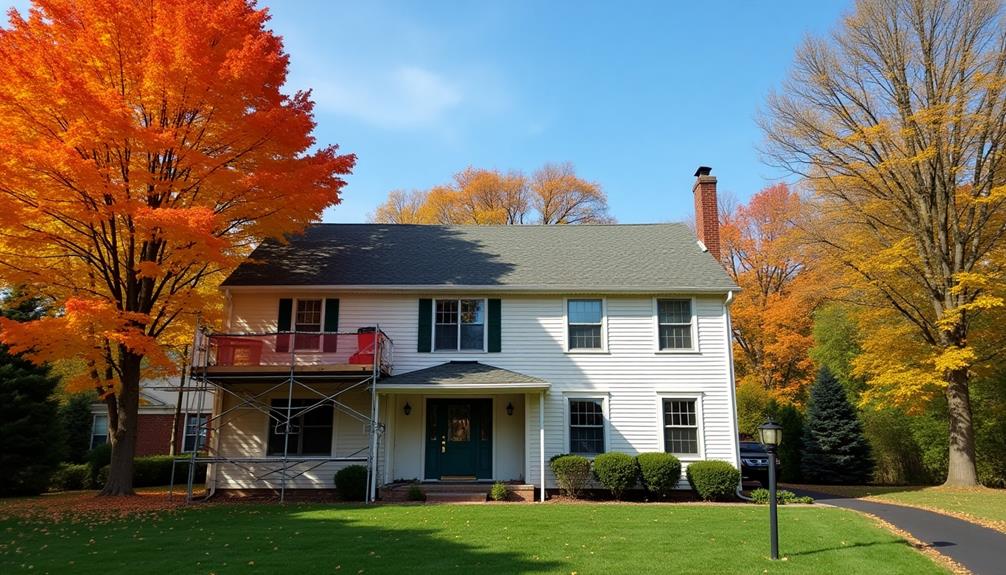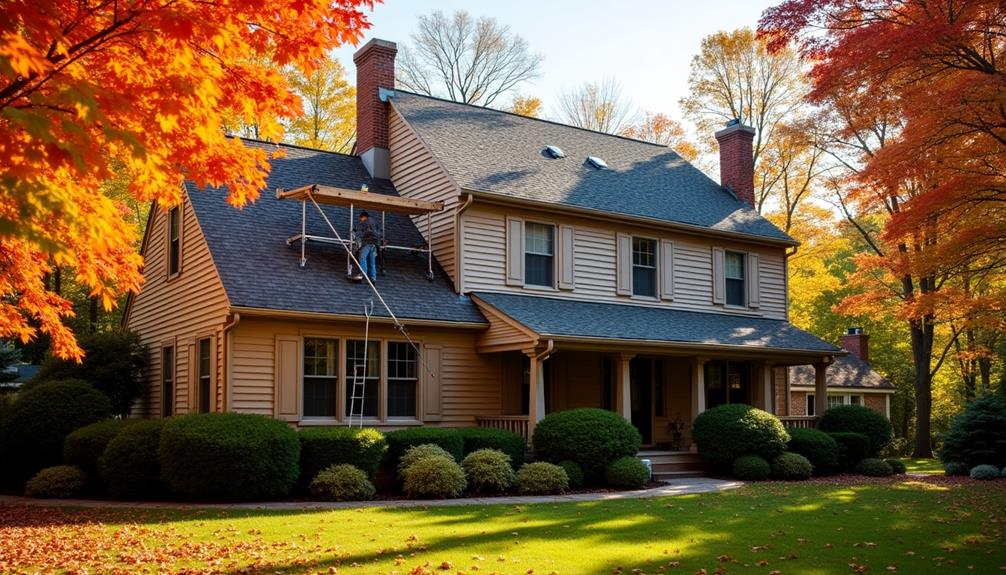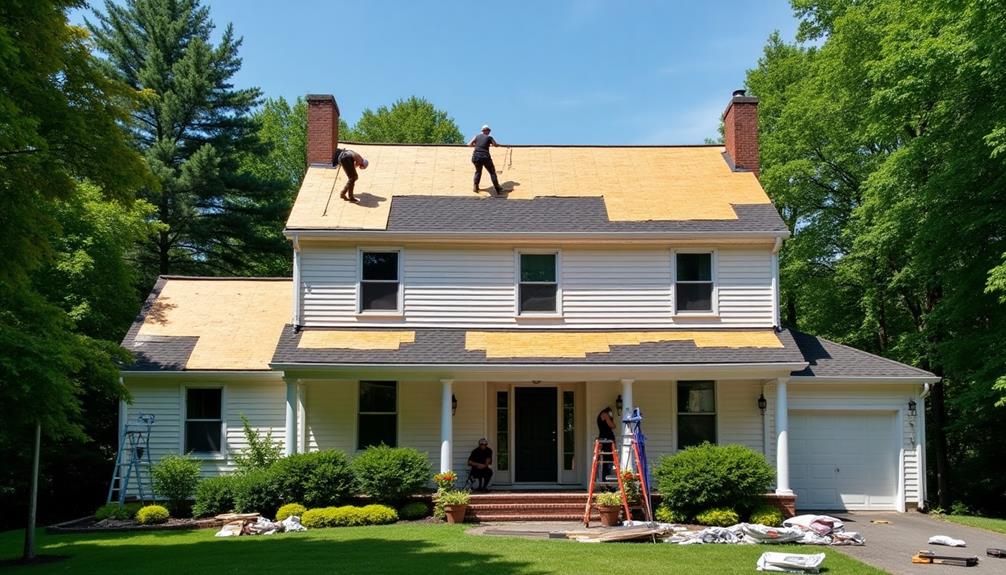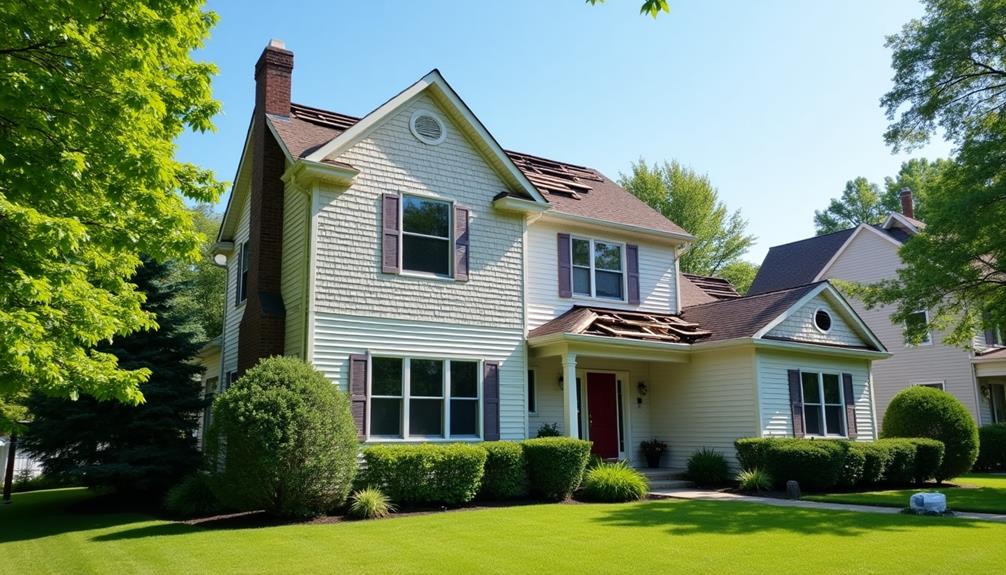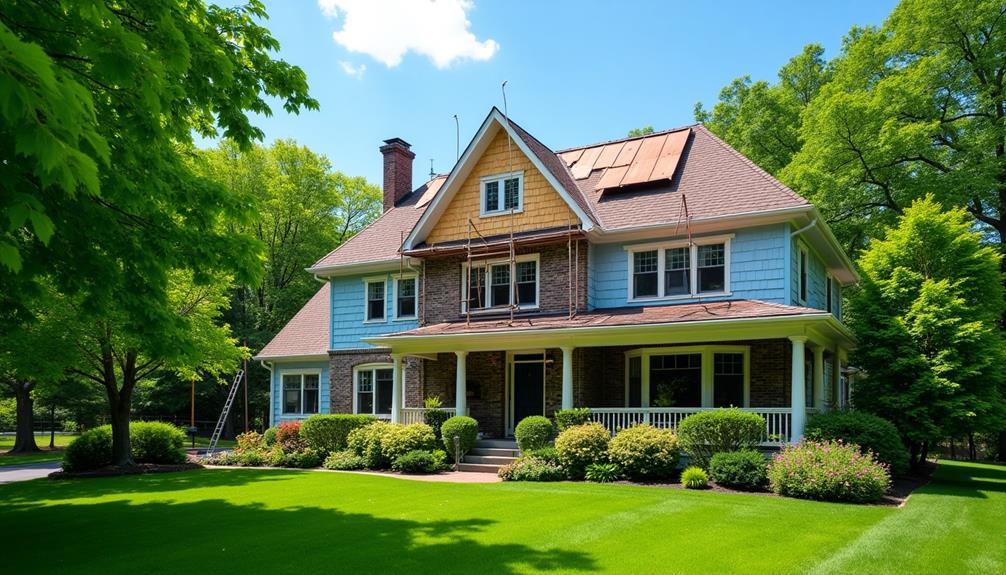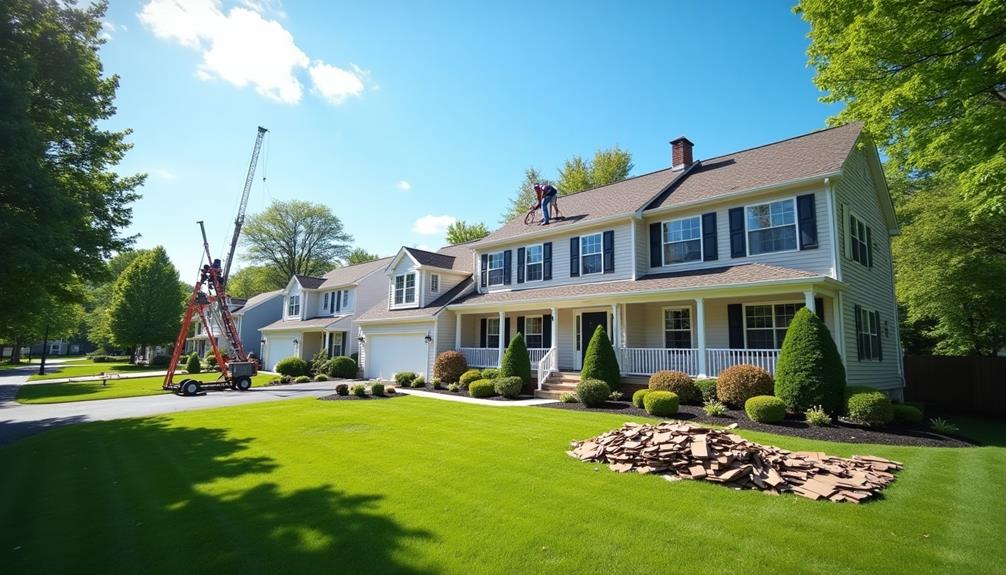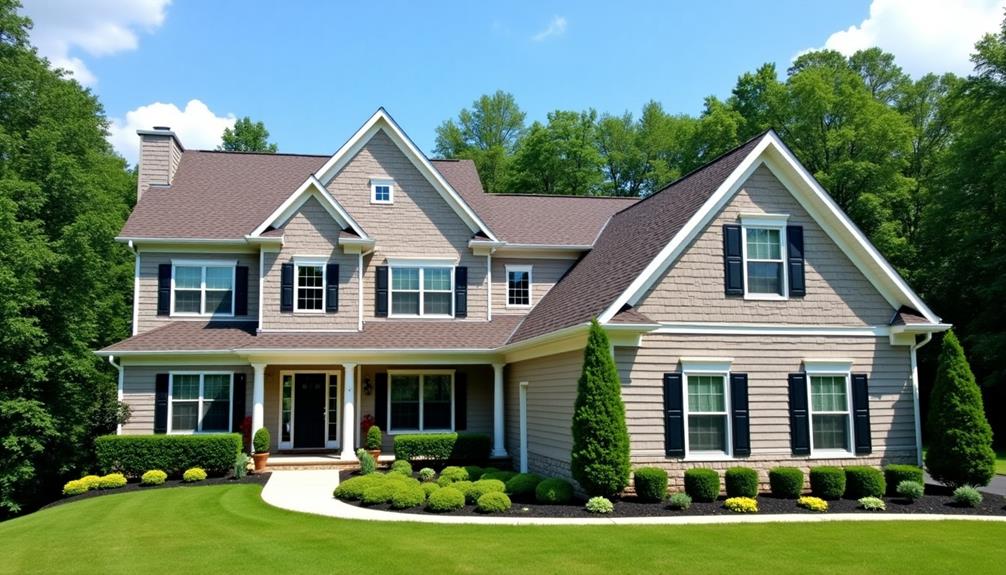If you're considering roof replacement in Union, NJ, it's vital to assess the condition of your current roof. Look for signs like cracked or missing shingles, sagging areas, and increased energy bills. Choose durable materials that suit local weather conditions and align with building codes to avoid penalties. Professional installation ensures adherence to safety standards and enhances energy efficiency, ultimately safeguarding your investment. Don't forget to factor in costs, from materials to labor, and consider eco-friendly options for added benefits. Explore the key elements of a successful roof replacement to make informed decisions that best support your home's needs.
Importance of Roof Replacement
When it comes to maintaining your home's integrity, roof replacement is crucial. Over time, your roof's lifespan diminishes due to various factors like weather conditions, material degradation, and wear and tear. Typically, asphalt shingles last around 20 years, while metal roofs can endure for 50 years or more. Knowing this, you need to assess your roof periodically to ensure it meets structural and aesthetic standards.
Moreover, the environmental impact of a deteriorating roof shouldn't be overlooked. An inefficient roof can lead to increased energy consumption, as it fails to properly insulate your home. This inefficiency not only raises your utility bills but also contributes to higher greenhouse gas emissions.
By opting for a roof replacement, you enhance your home's energy efficiency, potentially utilizing eco-friendly materials that minimize your carbon footprint.
Investing in a new roof isn't just about aesthetics; it's about safeguarding your home's value and promoting sustainability. By understanding the importance of roof replacement, you're taking a proactive step towards ensuring your home remains a safe, energy-efficient space for years to come.
Signs You Need a New Roof
Recognizing the signs that you need a new roof can prevent costly damage to your home. One of the first indicators is visible wear and tear, such as cracked, curled, or missing shingles. These conditions compromise your roof's integrity and can lead to leaks.
Conduct regular leak detection, especially after heavy rain or storms, to identify any water intrusion early on.
Another sign is an increase in energy bills. If your home isn't maintaining a consistent temperature, your roof may not be providing adequate insulation, affecting energy efficiency.
Look for signs of sagging in your roofline; this often points to structural issues that require immediate attention.
Additionally, check your attic for light shining through gaps or moisture accumulation. These issues signal that your roof's protective layer may be failing.
If you notice granules from shingles in your gutters, it's another sign that your roof is nearing the end of its lifespan.
Choosing the Right Materials
How do you decide which roofing materials are best for your home in Union, NJ? Start by assessing both material durability and aesthetic appeal. Different materials offer varying lifespans and resistance to weather conditions prevalent in your area.
For instance, asphalt shingles may be cost-effective, but they generally last around 15-30 years. In contrast, metal roofing provides superior durability, often lasting 40-70 years, making it a strong contender.
Next, consider the aesthetic appeal of your chosen material. You want your roof to complement your home's design and overall curb appeal.
Slate and tile roofs can add a sophisticated touch, while wood shakes provide a rustic charm. Be mindful that some materials may require more maintenance than others, which could affect your long-term satisfaction.
Local Building Regulations
Before you start your roof replacement project in Union, NJ, it's crucial to understand the local building regulations, which include specific permit requirements.
You'll need to ensure your plans comply with building codes to avoid potential fines or project delays.
Additionally, familiarize yourself with the inspection process to confirm that your work meets all safety and quality standards.
Permit Requirements Overview
When planning a roof replacement in Union, NJ, it's crucial to understand the local building regulations regarding permits. You'll typically need to secure a building permit, which is essential for ensuring that your project complies with local codes.
There are various permit types you might encounter, including residential roofing permits and special permits for certain materials or structural modifications.
The application process for obtaining a permit involves several steps. First, you'll need to gather necessary documentation, such as detailed plans for your new roof and specifications of the materials you plan to use.
You'll then submit this information along with the permit application form to the Union Township Building Department. Be prepared to pay the applicable fees, which can vary based on the scope of your project.
Once your application is submitted, the building department will review it to ensure compliance with local regulations. It's wise to allow ample time for this review, as it can take several days or even weeks.
After approval, you'll receive your permit, allowing you to proceed with your roof replacement legally and safely. Always keep a copy of the permit on-site during the project to avoid any issues.
Building Codes Compliance
Understanding building codes compliance is essential for a successful roof replacement in Union, NJ, as these regulations ensure that your project meets safety and structural standards. Familiarizing yourself with local building codes not only enhances building safety but also helps you avoid costly fines or rework. These codes are subject to regulatory updates, so staying informed is crucial.
Here's a quick reference to key aspects of building codes compliance for roof replacements:
| Aspect | Requirement | Importance |
|---|---|---|
| Material Standards | Use approved materials | Ensures durability |
| Load-Bearing Capacity | Meet specified loads | Prevents structural failure |
| Roof Slope | Adhere to local specs | Facilitates water drainage |
| Ventilation | Proper ventilation needed | Prevents moisture buildup |
Inspection Process Explained
The inspection process is a critical phase in ensuring your roof replacement project complies with local building regulations in Union, NJ. You'll need to schedule a roof inspection at various stages of your project to confirm compliance and safety.
An inspection checklist is essential, detailing key aspects like materials used, structural integrity, and roofing safety measures.
Inspection frequency typically occurs before, during, and after the replacement process. During the initial phase, a damage assessment will help identify existing issues that need addressing.
As the project progresses, use appropriate inspection tools to evaluate the work done and ensure it meets local codes.
Weather impact plays a significant role in roofing projects; thus, inspections should consider any adverse conditions that might affect the material or installation.
After completing the project, an inspection report is generated, documenting findings and expert evaluations. This report is crucial for understanding compliance and for any future repairs.
Cost Factors to Consider
When replacing your roof, several cost factors significantly influence the overall expense.
The choice of materials affects not just the upfront cost but also long-term durability and maintenance.
Additionally, the size of your roof and labor costs can vary widely, impacting your total investment in the project.
Material Selection Impact
Choosing the right roofing material can significantly influence your overall replacement costs in Union, NJ. Different materials come with varying price points and lifespans, which are crucial cost factors.
For instance, asphalt shingles are typically more affordable upfront but may require replacement sooner than metal or slate options, which can be pricier initially yet last much longer.
Sustainability factors also play a role in material selection. Eco-friendly options, such as recycled shingles or solar tiles, might have higher initial costs but can lead to savings in energy bills over time and may qualify for tax incentives.
Investing in sustainable materials can enhance your property's value and appeal to environmentally conscious buyers.
Aesthetic choices shouldn't be overlooked either. The visual impact of your roofing material can affect the overall curb appeal, influencing potential resale value.
High-end materials like clay tiles or natural slate offer distinctive looks that can set your home apart, but they also come with higher installation costs.
Ultimately, balancing cost, sustainability, and aesthetics will guide you in making the best decision for your roof replacement project in Union, NJ.
Roof Size Considerations
Determining the size of your roof is a crucial factor that often impacts replacement costs in Union, NJ. Accurate roof area calculations are essential to estimate materials and labor effectively.
To begin, you'll want to employ various roof measurement techniques, such as using a laser measure or an app designed for roofing. These methods can provide precise measurements, reducing the chance of errors that might otherwise lead to unexpected costs.
Once you have your measurements, calculate the total square footage of your roof. This involves measuring the length and width of each section of your roof and applying the appropriate formulas to find the area. For example, if your roof has multiple sections or varying pitches, break it down into simpler shapes, like rectangles and triangles, and sum the areas.
Keep in mind that the complexity of your roof design can also influence the total area calculations. Features such as dormers, chimneys, or valleys may require additional material, which can inflate costs.
Labor Costs Breakdown
Understanding labor costs is essential for budgeting your roof replacement in Union, NJ. The first step is conducting a labor wage analysis, which helps you understand the average hourly rates for roofing professionals in your area. Typically, these rates can vary based on factors like the contractor's experience, the complexity of the job, and local market conditions.
Next, consider the installation timeframes. The duration of your roof replacement project directly impacts labor costs. A straightforward installation might take just a few days, while a more complicated job, such as a multi-layer tear-off or extensive repairs, could take significantly longer.
Make sure you discuss the estimated timeframe with your contractor; this will help you gauge the total labor costs involved.
Additionally, remember to factor in any potential delays due to weather or material availability, as these can extend installation timeframes and increase labor expenses.
Finding Reliable Contractors
Finding reliable contractors for your roof replacement in Union, NJ, can often feel overwhelming. However, a systematic approach can simplify the process.
Start by gathering contractor reviews from various platforms, including Google, Yelp, and the Better Business Bureau. Look for consistent positive feedback highlighting the quality of work and customer service. Pay attention to any negative reviews and how the contractors responded to them.
Next, don't hesitate to ask for references from potential contractors. A reputable contractor will provide you with a list of satisfied clients who can speak to their reliability and professionalism.
Additionally, inquire about service warranties on both materials and workmanship. A strong warranty indicates the contractor's confidence in their services and provides you with peace of mind regarding your investment.
Benefits of Professional Installation
Choosing a reliable contractor is just the first step in your roof replacement journey; the benefits of professional installation can significantly impact the longevity and performance of your new roof. By opting for a professional, you're ensuring that the installation adheres to industry standards and manufacturer specifications. This meticulous attention to detail minimizes the risk of issues like leaks or improper ventilation, which can compromise your roof's integrity over time.
Another critical advantage is the availability of installation warranties. These warranties provide peace of mind, protecting you against potential defects or installation errors that could arise. If something does go wrong, you won't be left to shoulder the costs; your contractor will handle repairs or replacements, saving you from unexpected expenses.
Moreover, professional installation can lead to long-term savings. A properly installed roof enhances energy efficiency, which can reduce your utility bills significantly. Additionally, the durability and performance of a professionally installed roof often mean fewer repairs and replacements in the future.
In the end, investing in professional installation not only secures your roof's immediate performance but also contributes to your financial well-being in the long run.
Maintenance Tips for New Roofs
A new roof represents a significant investment, and proper maintenance is crucial to maximizing its lifespan and performance. One of the most important maintenance tasks is roof cleaning. Debris, leaves, and algae can accumulate on the roof surface, leading to potential issues like water pooling and mold growth.
Regularly inspect your roof and remove any debris, especially after storms. You can use a soft-bristle broom or hire a professional cleaning service to ensure that your roof remains in optimal condition.
Gutter maintenance is equally vital. Clogged gutters can cause water to back up and seep under shingles, resulting in leaks and structural damage. Inspect your gutters at least twice a year, clearing out leaves and other obstructions.
Consider installing gutter guards to minimize debris buildup.
Additionally, you should check for any signs of wear and tear, such as loose or missing shingles. Addressing these issues promptly can prevent more extensive damage down the line.
Lastly, schedule a professional inspection every few years to identify any potential problems early. By following these maintenance tips, you'll help ensure your new roof remains durable and effective for many years.

